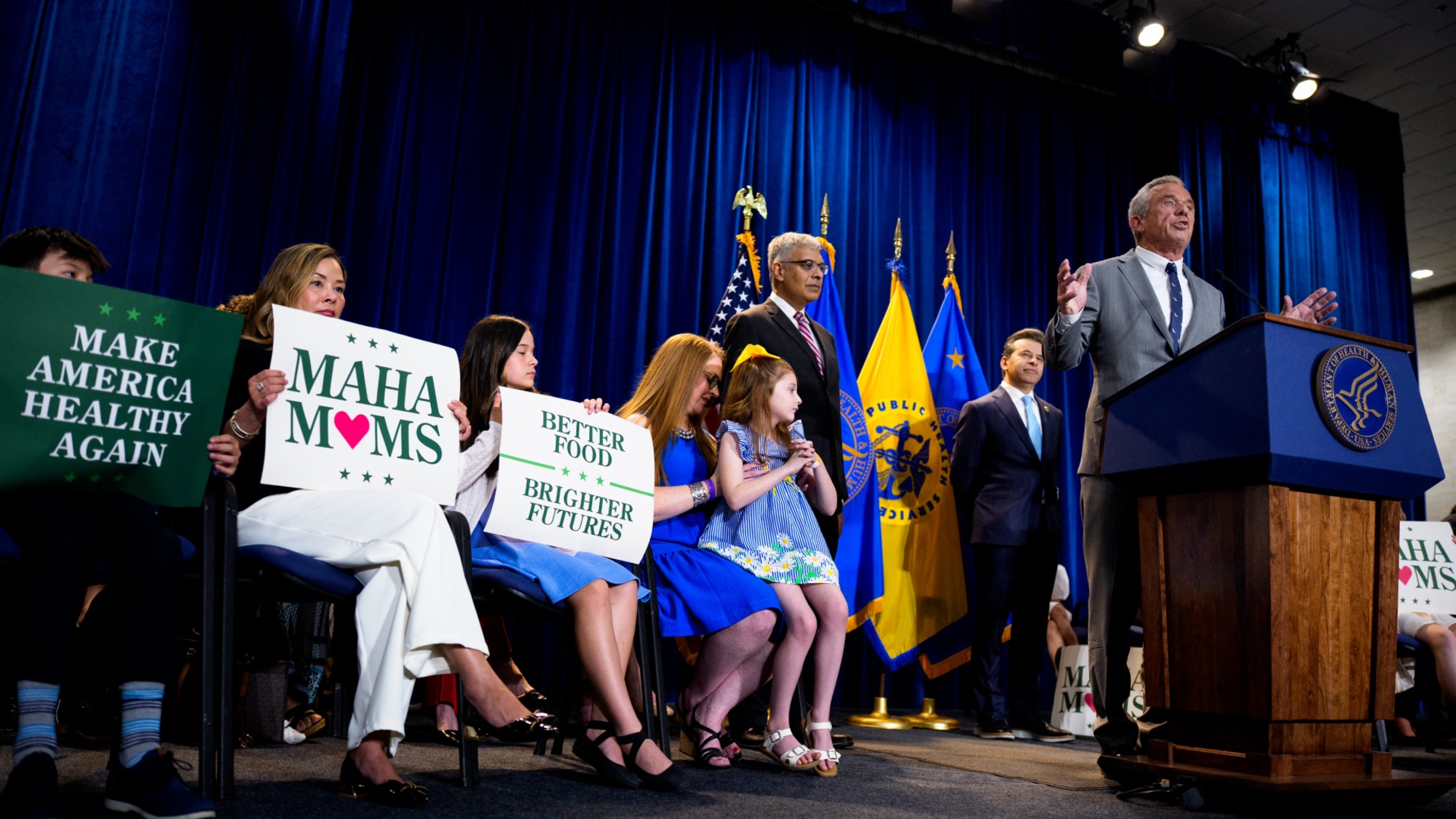RFK Jr.'s phase-out of artificial food dyes could face industry pushback
Will companies comply without an outright ban?


A free daily email with the biggest news stories of the day – and the best features from TheWeek.com
You are now subscribed
Your newsletter sign-up was successful
Health Secretary Robert F. Kennedy Jr. announced a timeline for his plans to eliminate petroleum-based synthetic food dyes that color many common foods in the nation's food supply. During a highly publicized press conference surrounded by officials from the Food and Drug Administration and his Make America Healthy Again (MAHA) mom supporters, Kennedy asserted that he had reached an "understanding" with major food manufacturers to remove the dyes by 2026. But it's not clear if and when companies will comply.
Kennedy ramps up his war on sugar
Four years from now, "we are going to have most of these products off the market, or you will know about them when you go to the grocery store," Kennedy said. His push to get food manufacturers to remove artificial dyes is his "first effort at sweeping reform of the food industry," which he has "long blamed for creating and marketing ultra-processed foods that he says are making Americans obese and contributing to a host of diseases," including diabetes and heart disease, said The New York Times. "Sugar is poison," Kennedy said, and "Americans need to know that it's poison."
FDA Commissioner Marty Makary stated that the agency has several actions planned to phase out the use of synthetic dyes. It will work with companies to voluntarily eliminate six commonly used dyes by the end of next year: FD&C Green No. 3, FD&C Red No. 40, FD&C Yellow No. 5, FD&C Yellow No. 6, FD&C Blue No. 1 and FD&C Blue No. 2.
The Week
Escape your echo chamber. Get the facts behind the news, plus analysis from multiple perspectives.

Sign up for The Week's Free Newsletters
From our morning news briefing to a weekly Good News Newsletter, get the best of The Week delivered directly to your inbox.
From our morning news briefing to a weekly Good News Newsletter, get the best of The Week delivered directly to your inbox.
The agency is also asking food companies to expedite the process of eliminating the previously banned Red dye No. 3 sooner than the 2027-2028 deadline previously set. Additionally, the FDA intends to partner with the National Institutes of Health to conduct comprehensive research on the impact of food additives on children's health and development. "For the last 50 years, American children have increasingly been living in a toxic soup of synthetic chemicals," said Makary, referring to studies that have linked synthetic dyes with attention-deficit/hyperactivity disorder and other health conditions. Removing petroleum-based food dye is "not a silver bullet that will instantly make America's children healthy, but it is one important step."
Companies have 'made promises like this before'
While Kennedy made statements about the "understanding" with food companies, no industry officials were present at the press conference to substantiate those claims. Industry officials told The Associated Press that no formal agreement exists. However, some companies have taken steps that suggest they plan to comply. PepsiCo CEO Ramon Laguarta stated that most of the company's products are already free of artificial dyes, and that its Lay's and Tostitos brands will phase out the use of these dyes by the end of this year. General Mills' representatives said the company is "committed to continuing the conversation" with the administration. WK Kellogg Co. officials said the company is reformulating cereals used in the nation's school lunch programs to eliminate the dyes.
The change will not happen overnight, even if companies do comply. It could take three to four years to build up the supply of botanical products needed for an industrywide shift toward natural dyes, the team at Sensient Technologies Corporation, one of the world's largest dyemakers, said. It is not as if there are "150 million pounds of beet juice sitting around waiting on the off chance the whole market may convert," Paul Manning, the company's chief executive, said to the AP. Tens of millions of pounds of the products "need to be grown, pulled out of the ground, extracted."
Some synthetic dye critics were hoping for an outright ban, not a voluntary agreement from food manufacturers. Food companies have "made promises like this before," said Thomas Galligan, principal scientist at watchdog group Center for Science in the Public Interest, to NPR. They have claimed they would eliminate dyes or other additives within a specific timeframe and then "consistently reneged on those promises."
A free daily email with the biggest news stories of the day – and the best features from TheWeek.com
Theara Coleman has worked as a staff writer at The Week since September 2022. She frequently writes about technology, education, literature and general news. She was previously a contributing writer and assistant editor at Honeysuckle Magazine, where she covered racial politics and cannabis industry news.
-
 The environmental cost of GLP-1s
The environmental cost of GLP-1sThe explainer Producing the drugs is a dirty process
-
 Nuuk becomes ground zero for Greenland’s diplomatic straits
Nuuk becomes ground zero for Greenland’s diplomatic straitsIN THE SPOTLIGHT A flurry of new consular activity in Nuuk shows how important Greenland has become to Europeans’ anxiety about American imperialism
-
 ‘This is something that happens all too often’
‘This is something that happens all too often’Instant Opinion Opinion, comment and editorials of the day
-
 ‘Longevity fixation syndrome’: the allure of eternal youth
‘Longevity fixation syndrome’: the allure of eternal youthIn The Spotlight Obsession with beating biological clock identified as damaging new addiction
-
 Europe’s apples are peppered with toxic pesticides
Europe’s apples are peppered with toxic pesticidesUnder the Radar Campaign groups say existing EU regulations don’t account for risk of ‘cocktail effect’
-
 Mixed nuts: RFK Jr.’s new nutrition guidelines receive uneven reviews
Mixed nuts: RFK Jr.’s new nutrition guidelines receive uneven reviewsTalking Points The guidelines emphasize red meat and full-fat dairy
-
 Trump HHS slashes advised child vaccinations
Trump HHS slashes advised child vaccinationsSpeed Read In a widely condemned move, the CDC will now recommend that children get vaccinated against 11 communicable diseases, not 17
-
 Health: Will Kennedy dismantle U.S. immunization policy?
Health: Will Kennedy dismantle U.S. immunization policy?Feature ‘America’s vaccine playbook is being rewritten by people who don’t believe in them’
-
 Choline: the ‘under-appreciated’ nutrient
Choline: the ‘under-appreciated’ nutrientThe Explainer Studies link choline levels to accelerated ageing, anxiety, memory function and more
-
 RFK Jr. sets his sights on linking antidepressants to mass violence
RFK Jr. sets his sights on linking antidepressants to mass violenceThe Explainer The health secretary’s crusade to Make America Healthy Again has vital mental health medications on the agenda
-
 This flu season could be worse than usual
This flu season could be worse than usualIn the spotlight A new subvariant is infecting several countries
